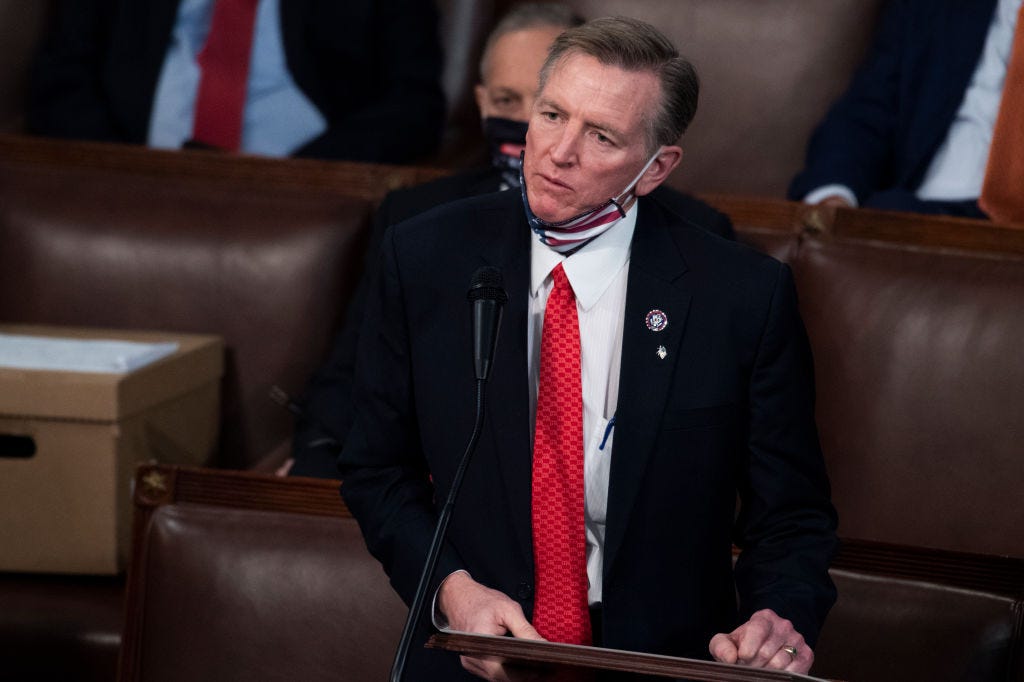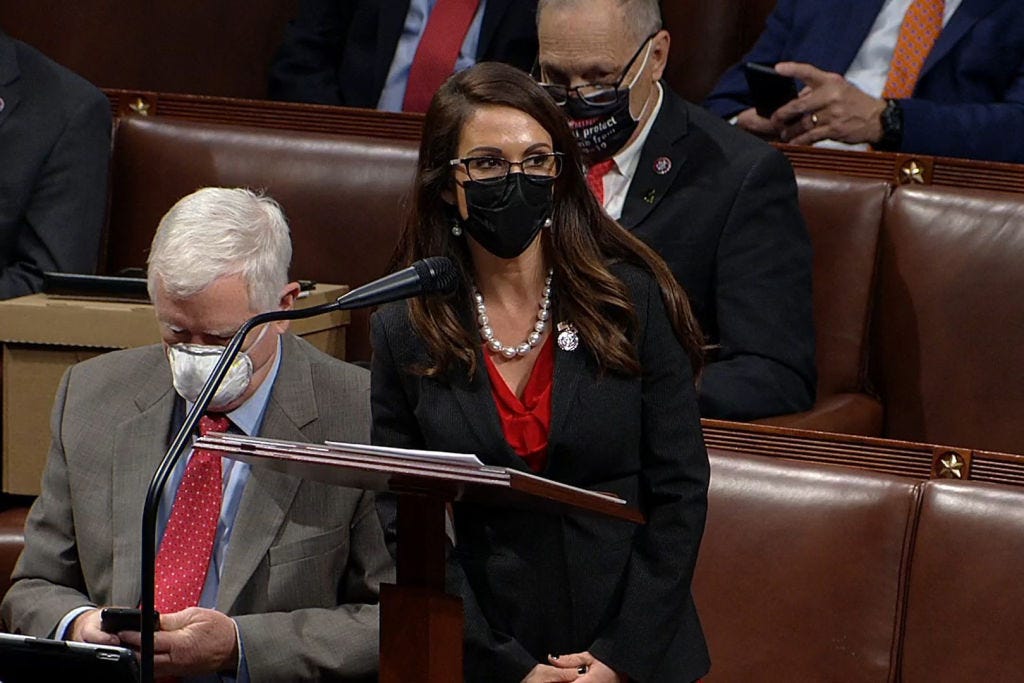Everything We Know About The Role Members Of Congress Played On January 6
There was an official component to what happened that day.

As part of this newsletter focusing on January 6, I want to re-establish some key facts and context regarding the violent attempt to overturn the 2020 presidential election results.
A recent article highlighting comments far right activist Ali Alexander made about coordinating with members of Congress provided a great opportunity to highlight one of these important baselines for the January 6 conversation: members of Congress were clearly involved in what happened.
The new reporting came courtesy of CNN’s KFile team, which surfaced deleted videos Alexander posted on the Periscope streaming site. According to CNN, the clips were mysteriously “removed” from Periscope. Alexander did not respond to emailed questions from The Uprising including about who deleted the videos.
Alexander, a leader of the “Stop The Steal” movement dedicated to fighting President Biden’s election, helped organize an event dubbed the “Wild Protest” that was set to take place in the U.S. Capitol on January 6. He has provided documents and testimony to the House select committee investigating the violence at the Capitol.
In one of the clips, dated January 2, 2021, Alexander claimed he worked with Rep. Paul Gosar (R-AZ), Rep. Mo Brooks (R-AL), and Rep. Andy Biggs (R-AZ) to “whip up” Republican votes against the certification of President Biden’s victory over former President Trump in the 2020 election that took place on January 6.
"Who worked with Congressman Mo Brooks to whip up votes in the House, Congressman Paul Gosar to whip up votes in the House, Congressman Andy Biggs, to not only whip up votes in the House, but also let me know who the soft senators were because he briefed them in the Steering committee?” Alexander asked in the clip. “Boom, we've been doing the work.”
CNN also pointed to another clip from December 17, 202,0 where Alexander said he “talked with Mo Brooks” and the congressman’s staff.
This is not the first time Alexander’s claims he worked with this trio of Republican House members have drawn public attention. In the days after the attack, the Project on Government Oversight, a non-profit group, spotlighted another one of Alexander’s deleted videos where the activist declared that he “came up with the Jan. 6 idea with Congressman Gosar, Congressman Mo Brooks, and Congressman Andy Biggs” and described them as having “schemed up on putting maximum pressure on Congress.” And, as previously noted in this newsletter, Alexander appeared in Fox News host Tucker Carlson’s documentary-style special that downplayed the violence and suggested the Capitol rioters were victims of some type of false flag conspiracy designed to marginalize pro-Trump conservatives. In that special, Carlson aired a snippet of what he described as “never-before-aired tape of a January 6 planning session that took place between Ali Alexander and several members of Congress.” On Carlson’s broadcast, Alexander suggested he “consulted members of Congress” who viewed his protests as something that “would add pressure” on Republicans to support blocking electoral certification.
CNN also noted a December 2020 clip where Alexander talked about having the militant groups Oathkeepers and Proud Boys set up “patrols of men” to provide security at the January 6 rally. Dozens of members of both groups have been charged with crimes related to the storming of the Capitol. The House select committee investigating January 6 has also taken an interest in the role militant groups including the Proud Boys, Oathkeepers, First Amendment Praetorian, and the Three Percenters played that day.
Alexander’s comments aren’t the only account of alleged conference call planning sessions between members of Congress and activists who planned pro-Trump events in Washington on January 6, 2021. The first major described of planning calls came in a piece I published for Rolling Stone in October that described allegations from a pair of pro-Trump election protest organizers who ultimately went on record in the magazine and spoke to the committee. Those organizers said the members of Congress who participated or had staff join the calls included Biggs, Brooks, Gosar, Rep. Madison Cawthorn (R-NC), Rep. Lauren Boebert (R-CO), Rep. Louie Gohmert (R-TC), and Rep. Marjorie Taylor Greene (R-GA).
However, it is important to note that we didn’t need any of this investigative reporting from CNN, yours truly, or anyone else to know that members of Congress were involved on January 6. Members of Congress clearly played a major role in the efforts to overturn the election that day.
Gosar, Greene, Boebert, and Rep. Lance Gooden (R-TX) were all billed as speakers at Alexander’s “Wild Protest,” which did not proceed as planned amid the violence. Brooks and Cawthorn both took the stage at an earlier rally that day at the White House Ellipse where President Trump delivered the final speech and encouraged the audience to march to the Capitol. These rallies in DC were the culmination of weeks of protests against the election around the country planned by some of the same activists. Many Republican leaders also joined Trump in making false and misleading claims questioning the election. Writers at Just Security have compiled an exhaustive timeline detailing how Brooks was a particularly important part of this push. The centerpiece of this effort to block the election took place within the halls of Congress.
“Stop The Steal” and other pro-Trump protest groups focused on encouraging Republicans to object to the electoral certification at the Capitol on January 6, 2021. Ultimately, in a debate that was interrupted by the violent crowds breaking into the building, 147 members of Congress — eight from the Senate and 139 from the House — voted to overturn the vote.
There were eight Republican House members who were either advertised speakers in Alexander’s event, allegedly part of planning calls, or on stage at the Ellipse — Gosar, Biggs, Brooks, Boebert, Cawthorn, Gooden, Gohmert, and Greene. All eight supported objections to the election on the House floor.
These stories combine to paint a clear picture: Members of Congress were a major part of the efforts to block the electoral certification that day.

Those who have been asked about their involvement in the push to overturn the election have stressed they simply supported an objection to the vote and played no role in violence. Alexander, who has not been accused of any unlawful activity in conjunction with January 6, has consistently insisted that, as he put in his opening statement before the committee last month, that he “had nothing to do with any violence or lawbreaking that happened.”
It is indeed clear that there were violent and non-violent components to the attempt to overturn the election on January 6. But it is also clear that, along with activists and militant groups, there was an official component to what happened that day.
Keep reading with a 7-day free trial
Subscribe to Hunter Walker's Substack to keep reading this post and get 7 days of free access to the full post archives.

